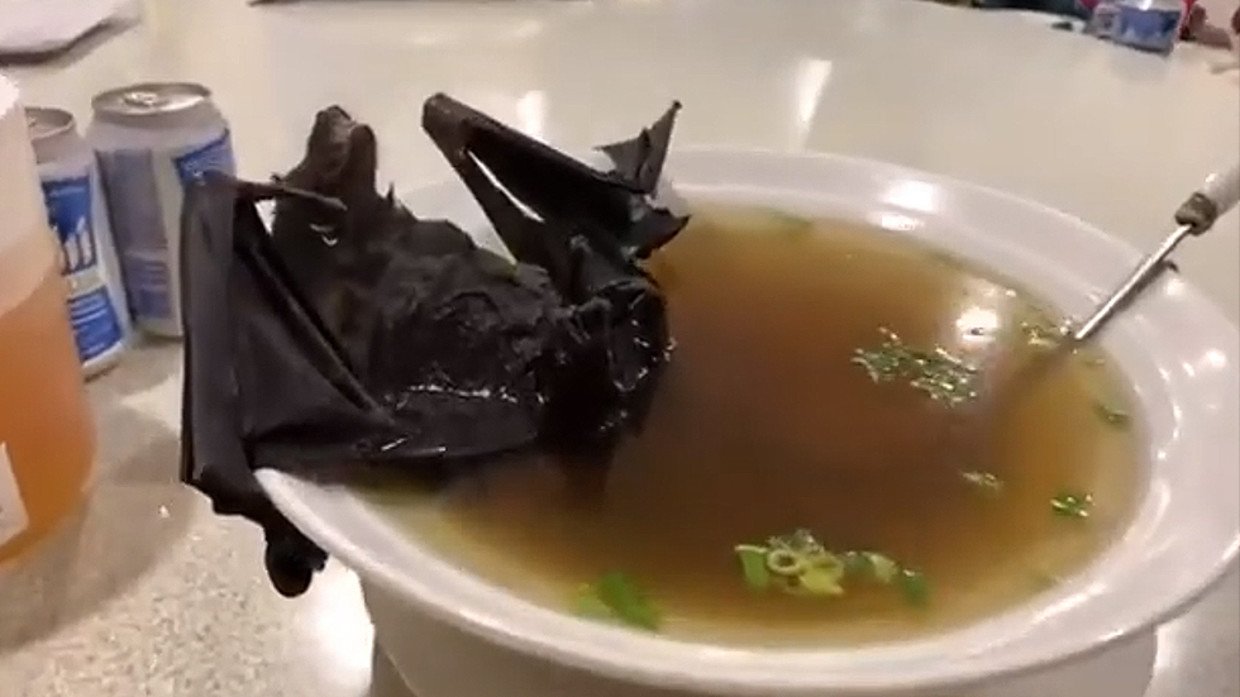A group of Chinese scientists today reported that the likely source of the deadly 2019‐nCoV virus is snakes, based on genetic analysis. However, grisly images from a Chinese restaurant suggest bats may also be on the menu.
Editor’s note: After publication, it was revealed that the footage and images featured in this article were originally published online in 2017. Therefore, they likely had no direct link to the coronavirus outbreak.
Their findings were fast-tracked to publication yesterday in the Journal of Medical Virology, and report that infected people were exposed to various wildlife species at the market, where live poultry, seafood, bats and snakes among others, were present.
A detailed genetic analysis of 2019‐nCoV revealed that it is a new strain which seems to be a mixture of two other coronaviruses; one of which is from bats and another unknown strain. The group presented evidence that the last place the virus resided before hitting humans was a snake species, based on certain biological markers in the virus’s surface proteins. These proteins are what allow viruses to invade host cells, and the mutated form is allowing 2019‐nCoV to easily attack human cells.
Also on rt.com Beijing city cancels major public events including Chinese New Year temple fairs due to coronavirus outbreakSo according to the scientists, at some point a bat virus jumped into snakes, and adapted to its immune system. Later, people at the Wuhan market either handling or eating snake meat became infected. But images surfacing from Wuhan, and released by the Daily Star Online, offer another, even grosser explanation. Could the virus have leapt directly to humans from bats?
Soup du jour
Different cultures eat exotic foods, and Chinese people are well known for having a taste for some meats that might raise eyebrows or even churn stomachs. But bat soup?! Amazingly, it is apparently very popular in China, and considered a delicacy there.
The images have to be seen to be believed — they appear to show the full body of a small black bat, leathery wings and all, perched in a dish of brown liquid and leering like a vampire in disguise. One video shows a girl putting the creature whole into her mouth as she dines with friends. But it looks like the bats may have had the last laugh.
Also on rt.com Second city shuts down all public transport amid deadly virus outbreak in ChinaThe Chinese outbreak of the SARS virus in the early 2000s was eventually traced back to a colony of horseshoe bats in Yunnan province. Since we know that 2019‐nCoV is genetically closer to SARS than it is to any other virus, it seems probable that bats could be the carriers for this one too. These bats do not appear to have the tell-tale large ears of horseshoe bats, but they could be a closely-related species.
Offal-ly bad news
Most suggestively, in some of the images the bats’ guts are visible floating in the soup. If undercooked offal was consumed by humans this a likely source of the virus reaching humans, as some organs are breeding grounds for viruses.
Just last year there were reports of a plague that killed a husband and wife in western Mongolia — unrelated to the present outbreak. The couple ate the raw stomach, kidney and gall bladder of a marmot, and died soon after from a severe case of pneumonic plague. This plague, while having symptoms similar to the current outbreak, is caused by the bacteria Yersinia pestis. They used the offal as a traditional remedy. This prompted officials to quarantine the couple’s township, but happily there was no further spread of the plague.
Also on rt.com Goldman: China coronavirus could push oil down by $3Of course, cooking meat properly and thoroughly is one way of killing any bugs it may have been carrying. But viruses are more resistant to heat than many bacteria, and in any case, do you really trust the chefs serving up whole bats in murky broth to have passed their food safety inspection with flying colors?
But whether it is from snakes, bats or a combination of the two, as the virus rages on, researchers at least have a lead, if not a cure.
Like this story? Share it with a friend!

